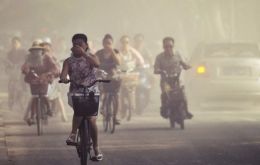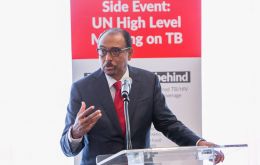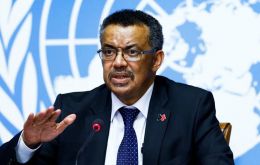MercoPress. South Atlantic News Agency
Tag: World Health Organization (WHO)
-
Monday, December 10th 2018 - 09:44 UTC
WHO: road traffic injuries the leading killer of children and young people

A new report by the World Health Organization (WHO) indicates road traffic deaths continue to rise, with an annual 1.35 million fatalities. The WHO Global status report on road safety 2018 highlights that road traffic injuries are now the leading killer of children and young people aged 5-29 years.
-
Tuesday, November 6th 2018 - 20:21 UTC
World Medical Association supports physicians involvement in combing air pollution

The World Medical Association has echoed a high-powered call for health professionals to be more involved in the management of childhood exposure to air pollution. The call has come at the first World Health Organization conference on air pollution being held in Geneva.
-
Tuesday, October 30th 2018 - 08:51 UTC
More than 90% of the world’s children breathe toxic air every day

Every day around 93% of the world’s children under the age of 15 years (1.8 billion children) breathe air that is so polluted it puts their health and development at serious risk. Tragically, many of them die: WHO estimates that in 2016, 600,000 children died from acute lower respiratory infections caused by polluted air.
-
Saturday, September 29th 2018 - 09:11 UTC
WHO-led initiative to reduce the use of alcohol by 10% by 2025

The World Health Organization (WHO) on Friday released SAFER, a new initiative and technical package outlining five high-impact strategies that can help governments reduce the harmful use of alcohol and related health, social and economic consequences.
-
Thursday, September 27th 2018 - 08:18 UTC
World leaders commit to bold targets and urgent action to end TB

World leaders meeting at the United Nations (UN) General Assembly have committed to ensure that 40 million people with tuberculosis (TB) receive the care they need by end 2022. They also agreed to provide 30 million people with preventive treatment to protect them from developing TB.
-
Saturday, September 22nd 2018 - 08:37 UTC
WHO publishes “Coming of Age” on better health for adolescents

The World Health Organization has published “Coming of age”, an in-depth online feature to advocate for better health for adolescents. The package includes video, gifs, visuals, and features on a range of topics on adolescent health, spanning mental health, sexuality education, as well as violence against and among youth, which remains a leading cause of adolescent deaths world-wide.
-
Saturday, July 28th 2018 - 08:54 UTC
WHO focuses on “Test.Treat.Hepatitis” on World Hepatitis Day

The World Health Organization (WHO) and partners are calling on countries to urgently increase hepatitis testing and treatment services in order to eliminate viral hepatitis as a public health threat by 2030.
-
Friday, June 29th 2018 - 08:25 UTC
World Trade Organization Panel rejects claims concerning tobacco plain packaging in Australia

A World Trade Organization (WTO) Panel has ruled against complaints brought by several countries concerning Australia’s tobacco packaging law, which implements the WHO Framework Convention on Tobacco Control and its Guidelines. The panel decided that Australia’s policy on plain packaging is consistent with WTO law.
-
Friday, June 29th 2018 - 08:21 UTC
The Protocol x Eliminate Illicit Trade in Tobacco Products is live

On 27 June 2018, the conditions for the entry into force of the first legally binding instrument adopted under the WHO FCTC were met, paving the way to eliminate illicit trade of tobacco products
-
Tuesday, June 19th 2018 - 06:56 UTC
WHO releases new International Classification of Diseases (ICD-11)

The World Health Organization (WHO) is releasing this Monday its new International Classification of Diseases (ICD-11). The ICD is the foundation for identifying health trends and statistics worldwide, and contains around 55 000 unique codes for injuries, diseases and causes of death. It provides a common language that allows health professionals to share health information across the globe.
